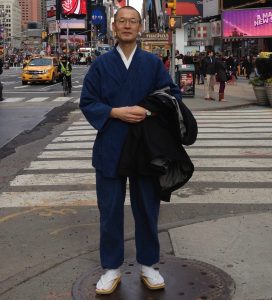
By Rev. Miki Nakura
Shakyamuni Buddha, founder of Buddhism said, “Our lifetime is filled with suffering.” He sought a path to free our selves from suffering. He experienced total calmness through deep sitting meditation, awakening to universal truth leading to spiritual freedom. I think this kind of meditation can help us overcome our differences in today’s world.
These days there are many conflicts dividing our world related to politics, religion, race and gender. It seems there’s increasing discrimination between people with different religions and opinions. Even within families, workplaces, communities and schools, communication is lacking. We humans live amidst a sad and miserable state of affairs.
Meditation can help. I recommend meditating the following way.
First straighten your lower back firmly, maintaining an upright posture. Second, close your eyes and exhale through your nostrils for as long as possible. Repeat breathing this way slowly, using long exhalations and short inhalations through your nose. Third, focus your energy in your lower belly during exhalation, filling the lower abdomen with power.
I think the biggest conflicts between human beings comes from our big brains, in other words, we put too much trust in our thinking. Our thoughts tend to split the world in two, dividing everything into opposites: right and left, white and black, man and woman, good and evil, happy and unhappy, Christian and Muslim, enemy and friend.
The Buddha explained this kind of dualistic thinking characterizes human nature, ultimately resulting in conflicts within our selves and other people. When dualistic thinking gets beyond our control, we become angry and begin to hate, reject, kick out, abuse, mistreat, insult and perhaps even physically harm others. These tendencies are inherent in human nature, which means all of us potentially may act this way.
We learn from Shakyamuni Buddha how to transcend dualistic thinking to realize a mind filled with equanimity and peacefulness. I think practicing sitting meditation in our daily lives, filling the lower belly with power, helps to contain our dualistic and discriminative thinking. This activity is accessible to everyone, helping us find peace and equanimity within ourselves and ultimately with other people.
I’d like to recount a story about Honen Shonin (1133-1212), who’s considered the founder of the Jodo (Pure Land) sect of Buddhism in Japan. Honen was a great Buddhist teacher. When he was nine years old, a samurai warrior attacked his father. As he lay dying, his father told him, “You may have a strong desire to avenge my death. Do not seek revenge on another man. I will soon die. Please seek the true world in which this other man and I together are saved without fail.”
These words caused young Honen eventually to become a Buddhist monk. For many years, he strived to find such a world. Finally at age 43, he encountered the Buddha world called Hongankai, or “vast sea of Buddha’s Original Prayer.” Honen began teaching there’s a world of great unconditional compassion in which our self-centered ego and dualistic thinking are broken and becomes one flavor, where friends and enemies together are saved without discrimination.
Honen composed this verse: “The moonlight shines everywhere, but it dwells only in the heart of one who feels grateful for it.”
The Buddha’s deep compassionate prayer, which certainly wants to save our minds, always shines softly like moonlight. The light breaks our self-centered desires and dualistic thinking and lets us enter a vast and peaceful world, where Buddhists, Christians, Muslims, Jews, atheists, black people, white people, brown people, communists, prisoners and others live together in diversity. Just as the world has innumerable rivers flowing into a vast ocean, they naturally become a single salty taste. This is a world unclouded by divided and dualistic thinking.
The Buddha’s awakening is an “awakening to the law of causation” or “the universal truth of arising causation.” All phenomena result from causes and conditions. All phenomena come into existence because of innumerable causes and conditions. Everything is created by a series of causes and conditions.
Therefore this self called “I” now lives because of innumerable causes and conditions since beginning-less time. This truth is wonderful, isn’t it? My body, head, eyes, ears, mouth, nose, hands, legs, internal organs, blood, bones, nerves, and cells now live here and now because of the working of innumerable causes and conditions. My thoughts, feelings, ideas, emotions, passions, and mind arise because of immeasurable causes and conditions. How wonderful!
The well-known Buddhist scholar D. T. Suzuki, wrote:
“O wonderful, wonderful,
and most wonderful wonderful!
and yet again wonderful…”
Suzuki particularly viewed the West as a world of dualistic thinking, contrasted by a world without dualistic thinking, where all beings are wonderfully and equally living together. This is the Buddha’s world as an ocean with a single salty taste.
Therefore by meditating deeply and listening earnestly to the Buddhist teaching in our daily lives, we may discover this wonderful world and live peacefully in diversity, walking hand-in-hand with each other.
Finally, I’d like to quote the following hymn composed by Shinran (1173-1262), the founder of Shin Buddhism, a disciple of Honen) to express the Buddha’s world.
“The wheel of light of liberation is limitless. All are touched by this light. Buddha says it frees us from concerns with ‘is’ or ‘isn’t.’ Return your life to the awakening that brings true equanimity!”
For more information about seiza meditation, please see the following downloads:
Fundamentals of Seiza meditation
Fundamentals of Seiza Using Chair
Seiza-Quiet-Sitting-Meditation
Rev. Miki Nakura is minister of the Jodo-Shinshu Shin-Buddhist New York Sangha in New York City.

